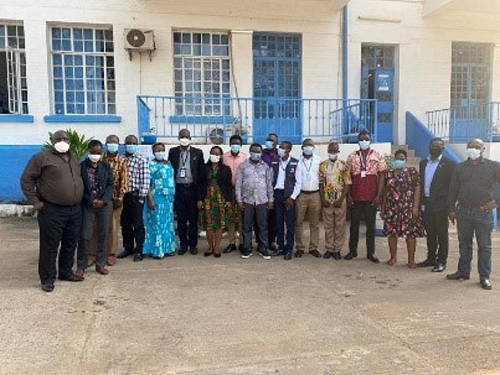Accelerating implementation by costing and budgeting Sierra Leone’s national action plan on antimicrobial resistance
Antimicrobial resistance (AMR) is a leading cause of death worldwide. In 2019, 1.27 million deaths globally were attributed to AMR with the highest death rates estimated in western sub-Saharan Africa (27.3 deaths per 100,000) [1]. Like many sub-Saharan African countries, Sierra Leone developed a multisectoral national action plan to tackle AMR in line with the 2015 Global action plan on antimicrobial resistance, which includes a multisectoral “One Health” approach. Costing and budgeting of national action plans is a critical first step to ensuring that efforts are feasible and can be implemented sustainably. Therefore, WHO developed a costing and budgeting tool for AMR national action plans which was piloted in six countries globally, including Sierra Leone. The successful development of a costed operational plan in Sierra Leone has facilitated the identification of available funding and funding gaps for full implementation of the national action plan.

How did Sierra Leone do it, and how did WHO support Sierra Leone?
In 2017, Sierra Leone established a multisectoral coordination group to integrate the country’s various AMR initiatives into a single, concerted effort for fighting AMR based a One Health approach. Ministries involved were the Ministry of Health and Sanitation; the Ministry of Agriculture, Forestry, and Food Security; and the Environmental Protection Agency. The coordination group developed Sierra Leone’s first national action plan on AMR – the National Strategic Plan for Combatting AMR (2018-2022) [2]. The plan has six strategic objectives: 1) to establish an AMR governance structure; 2) to improve AMR awareness and education; 3) to strengthen laboratory capacity and surveillance; 4) to reduce the incidence of infections through infection prevention and control (IPC); 5) to optimize antimicrobial use in all sectors; and 6) to ensure sustainable investment through research and development. Although the previous national action plan was well-designed, implementation was slow partly because its activities were neither prioritized nor properly costed and therefore adequate resources were not allocated.
Many countries face a similar issue – the 2020 Tripartite country self-assessment survey results showed that only 20% of reporting countries had costed and fully budgeted their national action plans [3]. To support countries in costing prioritized activities of their national action plan and identify existing funding and funding gaps, WHO developed the WHO Costing and Budgeting Tool for National Action Plans on AMR. The tool utilizes a modular approach, allowing different ministries or departments to independently cost components of the national action plan and consolidating their inputs into a fully costed national action plan.
In December 2020, Sierra Leone became the first country to pilot the costing and budgeting tool supported by all three WHO levels – WHO headquarters, the WHO Regional Office for Africa, and the WHO Country Office in Sierra Leone. Following an initial meeting with Sierra Leone’s AMR multisectoral governance mechanism, twelve costing coordinators, nominated by the Ministry of Health and Sanitation, the Ministry of Agriculture and Forestry, and the Ministry of Environment through the Environment Protection Agency, attended a three-day hybrid training in January 2021. Given the existing COVID-19 restrictions, trained staff in the WHO Country Office in Sierra Leone co-facilitated the training in person while external trainers connected virtually.
Following the training, the costing coordinators and the multisectoral coordinating committee met to prioritize activities for a two-year operational plan, which was then costed with support from WHO and the Food and Agricultural Organization (FAO) of the United Nations. One hundred eleven activities under 56 objectives were prioritized according to their expected impact and feasibility. Using the WHO costing and budgeting tool, the costing coordinators then developed a fully costed two-year operational plan with an estimated cost of 2.146 million US dollars. Sixty per cent of the plan’s budget was for strengthening AMR surveillance which was essential to help generate data towards Sustainable Development Goal (SDG) AMR indicator 3.d.2—Percentage of bloodstream infections due to selected antimicrobial-resistant organisms.
The training on the WHO costing and budgeting tool brought together costing coordinators across the human and animal health, agriculture, and environment sectors promoting a multisectoral approach to costing Sierra Leone’s national action plan. As prioritized activities were needed for costing the plan, the training also provided an impetus for the country to develop a two-year operational plan with priority activities. This was undertaken through a participatory approach involving various ministries, departments, and agencies. Despite the challenges that COVID-19 brought, Sierra Leone succeeded in developing its costed operational plan and is now well-positioned to mobilize resources for sustainable implementation of priority activities, including strengthening AMR surveillance. The lessons learned from Sierra Leone will be used by stakeholders to expand the use of the WHO costing and budgeting tool and to update or develop AMR national action plans for prioritization and resource mobilization, accelerating their implementation in the African region.
REFERENCE
[1] Murray CJ, Ikuta KS, Sharara F, Swetschinski L, Aguilar GR, Gray A et al. Global burden of bacterial antimicrobial resistance in 2019: a systematic analysis. Lancet. 2022 Jan 18:S0140-6736(21)02724-0. doi: 10.1016/S0140-6736(21)02724-0. Epub ahead of print. PMID: 35065702.
[2] Government of Sierra Leone. National strategic plan for combating antimicrobial resistance (2018-2022). 2017.
[3] Global database for the tripartite antimicrobial resistance country self-assessment survey (TrACSS). Geneva: World Health Organization; 2020. (https://amrcountryprogress.org/, accessed 28 January 2022).
Photo Credit: © WHO/Saffea Gborie
Photo Caption: Twelve AMR costing coordinators from Sierra Leone.
